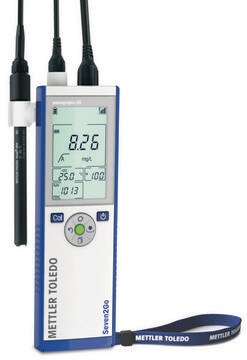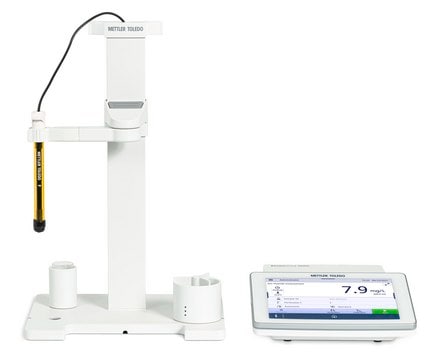MT51343100
Mettler-Toledo InLab® Expert pH electrode
without integrated temperature sensor, S7 connector
About This Item
Productos recomendados
Materiales
PEEK shaft
glass, U membrane
descripción
Reference electrolyte XEROLYT™ Polymer
Reference system ARGENTHAL™
Without cable
Características
S7 connector
fabricante / nombre comercial
Mettler-Toledo 51343100
intervalo de medición de la temperatura
0-100 °C
L × diám.
120 mm × 12 mm
intervalo de pH
0-14
¿Está buscando productos similares? Visita Guía de comparación de productos
Descripción general
Ideal for a wide range of applications including emulsions, suspensions, effluent water and solutions containing proteins and sulphides.
The InLab Expert electrode has been designed with long life in mind.
The fine-pored ceramic junction used in conventional electrodes can easily become contaminated in critical media such as suspensions and wastewater. In contrast the InLab Expert electrode with a solid polymeric electrolyte requires no junction at all. As a result these sensors are particularly insensitive to contamination.
The reference electrode on these sensors is in direct contact with the measured medium by means of two open junctions, hence there is no junction to block. In addition, the high grade plastic (PEEK) shaft offers a high level of chemical resistance and robustness. Service life and measurement accuracy are further improved by the ARGENTHAL™ reference system which reduces loss of silver chloride from the reference wire at differing sample temperatures. Different cables can be connected to the MultiPin™ head allowing use with a wide range of meters.
- High grade plastic shaft (PEEK)
- Polymer electrolyte XEROLYT™
- Open junction
- ARGENTHAL reference
Información legal
Código de clase de almacenamiento
11 - Combustible Solids
Clase de riesgo para el agua (WGK)
WGK 3
Punto de inflamabilidad (°F)
Not applicable
Punto de inflamabilidad (°C)
Not applicable
Certificados de análisis (COA)
Busque Certificados de análisis (COA) introduciendo el número de lote del producto. Los números de lote se encuentran en la etiqueta del producto después de las palabras «Lot» o «Batch»
¿Ya tiene este producto?
Encuentre la documentación para los productos que ha comprado recientemente en la Biblioteca de documentos.
Nuestro equipo de científicos tiene experiencia en todas las áreas de investigación: Ciencias de la vida, Ciencia de los materiales, Síntesis química, Cromatografía, Analítica y muchas otras.
Póngase en contacto con el Servicio técnico





